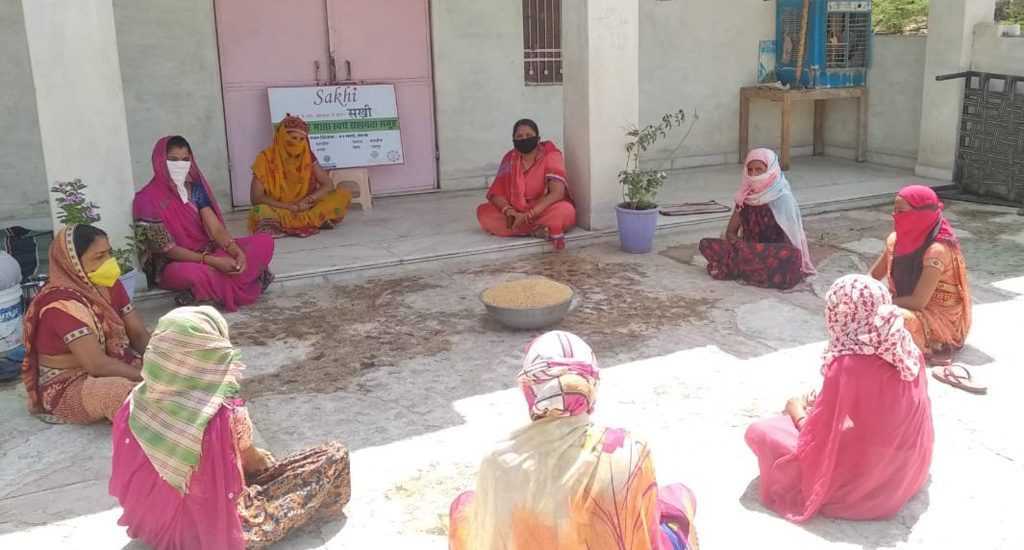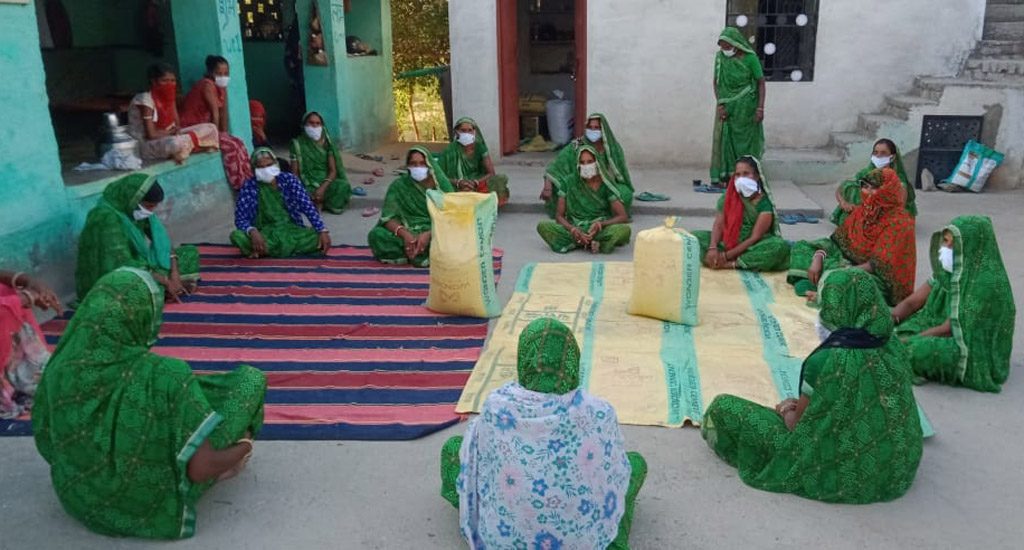
Women contribute grains to support vulnerable families during lockdown
With no labor work during lockdown, many women in remote villages lacked essentials to feed their family. Fellow women helped them by building a food bank with contributions

With no labor work during lockdown, many women in remote villages lacked essentials to feed their family. Fellow women helped them by building a food bank with contributions
Laxmi Devi, a widow, resides in Zawar village with her three children. Two of them study in a government school. She is a Scheduled Tribe and does not own any land. She and her family engage in farm labor and MGNREGS construction work. The average monthly income of her family is around Rs 3,000.
Zawar village in Girwa tehsil of Udaipur district is an area where the number of migrant laborers is high. Zawar and surrounding villages are remote and much further from the highway connecting Udaipur and Ahmedabad. The population is 3,213, and the houses are scattered.
Shanta Devi of Bhaladiya village and her family practice farming in the 0.25 hectare of land they own. She takes up labor and MGNREGS works too. Her three children study in a government school. The average monthly income of her family is around Rs 4,000.
Bhaladiya village in Sarad administrative block, located at about 40 km from Udaipur, has 250 families. About 95% of the population belongs are Scheduled Tribes. Agriculture and labor work are the main livelihoods.
The villages are underdeveloped. Due to the undulating terrain and lack of irrigation facilities, farmers practice subsistence agriculture. About 45% of the families migrate to Udaipur, Ahmedabad and Surat to earn their livelihood. Therefore women who stay back take care of their families.
Lockdown woes
The villages are devoid of basic amenities and essential items. Connectivity to places where villagers can get essentials is not good. When lockdown was announced on 24 March, subsistence became a real challenge for several people.
Shanta Devi’s husband Kalulal Meena does not work owing to poor health. Labor work is her only source of income. Shanta Devi did not have any grocery or essentials to feed her family during the lockdown. “This was the worst time, we faced as a family. There was no income to meet our daily needs,” she said.

Shanta Devi’s story is similar to what many women of Bhaladiya and other villages related. The villagers did receive the government aid of Rs 500 in their Jan-Dhan account. The government provides wheat to each family through the public distribution system (PDS). The villagers could not buy other essentials; also the PDS wheat they received lasted only for about 15 days.
Women collectives
Manjari Foundation, a non-profit organization based in Rajasthan, with funding support from Hindustan Zinc CSR brought more than 26,000 women together to form 2,163 self-help groups (SHGs). Groups of 10 to 15 SHGs were brought under 189 village organizations (VOs) and six federations.
Named the Sakhi project, the initiative aimed at social and economic empowerment of the women members. VOs helped the SHGs learn from one another and support each other in addressing challenges in the community.
Food collection
When the women discussed food security in times of lockdown, during their SHG meeting, they came upon the idea of building a food bank. The women decided to collect food grains from each household and support the vulnerable families that have been affected the most by the lockdown.
“We knew many poor people will not be in a position to buy provisions,” said one of the SHG members. The women decided that no one should go hungry. They decided to contribute whatever they could, irrespective of the quantity. At the meeting, the women decided they could seek support from the funding agency, panchayat and non-SHG villagers to help them get spices, oil, toiletries, sanitizer, etc.
From 16 April, SHG members collected wheat, rice, pulses, etc. from those who were in a position to contribute. They deposited the collected items at the VOs. The VOs recorded the contributions. The VOs in Zawar and Bhaladiya prepared a list of potential beneficiaries.
Food security
The VOs decided to help single women households, widows, people with special needs, those who did not own land and those caring for sick family members and the like. “It’s a small contribution. But the efforts should help the families cope with the lockdown crisis,” said Durga, member of Nari Shakti SHG and one of the volunteers at Zawar village.

“When the lockdown started, we did not have any labor work to earn and we faced hardships,” said Banwari Bai of Zawar village. “We didn’t have any grain left in our house. Then my VO members provided 30 kg of grain to my family, which was of immense help.”
Though the migrants had returned by this time, most of them had limited cash, and hence the SHGs’contribution was a welcome initiative. “In Zawar we helped 15 fellow women through the Sakhi Food Bank,” said Durga.
The women distributed 20 to 30 kg of food to each family, so that it would meet the family’s needs for about 25 days. “We are a family. Who will help, if we don’t help each other,” said Yashoda, one of the volunteers at Zawar village, reflecting the women’s efforts.
Naresh Nain is the program director at Manjari Foundation, and based at Udaipur. He has been practicing in the development sector, after completing development studies in Wageningen University, Netherlands. Sanjay Sharma is the executive director at Manjari Foundation, and based at Dholpur. An agri-engineer, he has completed his masters in sustainable international development from Heller School, Boston. Views are personal.